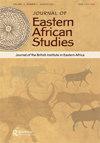Citizenship moods in the late Museveni era: a cartoon-powered analysis
IF 0.6
3区 社会学
Q2 AREA STUDIES
引用次数: 1
Abstract
ABSTRACT This article develops the concept of citizenship moods to analyse citizens’ emotional (dis)engagements with the state in Uganda. Through a reflexive analysis of ethnographic and media material from 2019–2021, we claim that around the time of the 2021 elections, after 35 years of rule by Yoweri Museveni’s National Resistance Movement, the most prevalent moods among Ugandans were fear, contentment, cynicism, anger, hope, and despondency. Prior to the elections, hope soared, but this gave way to despondency following the state’s violent crack-down on opposition. Building on work on citizenship, affect, emotion, and politics, we theorise that citizenship moods are experienced both individually and collectively; coexist, transform, and fluctuate over time; and affect and are affected by political and societal change. In Uganda, a key change is the growth of intersecting ethnic, regional, generational, and class inequalities. Citizenship moods structure, transform, and vitalise the relationship between the state and its citizens, and analysing them contributes to imagining the possibilities of democratic change in Uganda and beyond. The article introduces a method of cartoon-powered sociopolitical analysis. The inherent attunement of cartoons to bodily postures and expressions enables analytical insight and effective communication of research results, and can contribute to advancing research justice.穆塞韦尼时代后期的公民情绪:一个以漫画为动力的分析
摘要本文提出了公民情绪的概念,以分析乌干达公民与国家的情感接触。通过对2019-2021年民族志和媒体材料的反射性分析,我们声称,在约韦里·穆塞韦尼的民族抵抗运动统治了35年之后,2021年大选前后,乌干达人最普遍的情绪是恐惧、满足、愤世嫉俗、愤怒、希望和沮丧。选举前,希望高涨,但随着该州对反对派的暴力镇压,这种希望被沮丧所取代。基于对公民身份、情感、情感和政治的研究,我们认为公民情绪是个人和集体共同经历的;共存、转变和随时间波动;影响并受到政治和社会变革的影响。在乌干达,一个关键的变化是交叉的种族、地区、代际和阶级不平等的加剧。公民情绪构建、转变和振兴国家与其公民之间的关系,分析它们有助于想象乌干达及其他地区民主变革的可能性。本文介绍了一种以漫画为动力的社会政治分析方法。卡通与身体姿势和表情的内在协调使研究结果能够得到分析性的见解和有效的交流,并有助于促进研究的公正性。
本文章由计算机程序翻译,如有差异,请以英文原文为准。
求助全文
约1分钟内获得全文
求助全文
来源期刊

Journal of Eastern African Studies
AREA STUDIES-
CiteScore
3.30
自引率
7.10%
发文量
12
期刊介绍:
Journal of Eastern African Studies is an international publication of the British Institute in Eastern Africa, published four times each year. It aims to promote fresh scholarly enquiry on the region from within the humanities and the social sciences, and to encourage work that communicates across disciplinary boundaries. It seeks to foster inter-disciplinary analysis, strong comparative perspectives, and research employing the most significant theoretical or methodological approaches for the region.
 求助内容:
求助内容: 应助结果提醒方式:
应助结果提醒方式:


